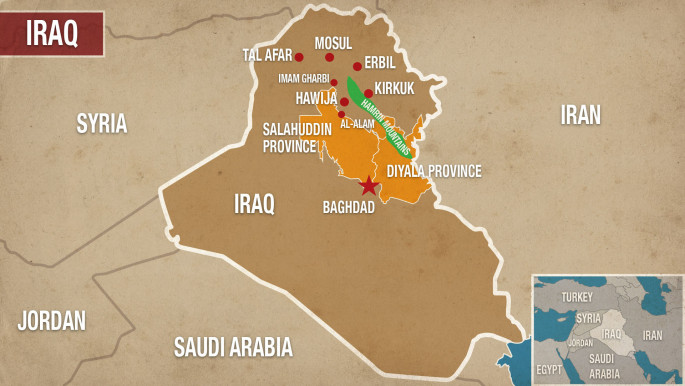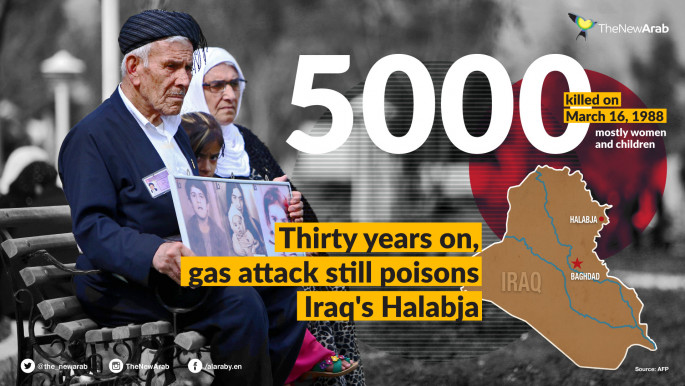The Iraq Report: Iran consolidates control within the Iraqi military
Click here to receive The Iraq Report each week in your inbox
Under pressure to win the support of pro-Iran clerics and Shia militias before elections kick off in two months, Iraqi Prime Minister Haider al-Abadi has officially and fully recognised the controversial Popular Mobilisation Forces (PMF) as part of Iraq’s military structure. The PMF, known as the Hashd al-Sha’abi in Arabic, has been accused of perpetrating some of the worst human rights abuses against largely Sunni Arab civilians during three years of war against the Islamic State group. Abadi’s move could yet be a trigger for further violence, and the further dissipation of Iraqi sovereignty as Iran takes more and more control.
Iran’s actions and those of its most prominent proxies in Iraq have not gone without rousing public anger, from Sunni and Shia alike. Senior political figures loyal to Tehran have become embroiled in corruption scandals involving Russian arms dealers, while Iran itself arrested a Shia cleric for delivering a sermon critical of Iranian Supreme Leader Ayatollah Ali Khamenei, enraging the cleric’s followers in the Shia-dominated Iraqi south. With local and national elections on the horizon, political expedience has made way for some interesting new business models, showing how Iraqi democracy is an exercise in money and influence rather than manifestos and transparent campaigns.
PM grants sectarian Shia militias military recognition
Iran’s deep and penetrating influence over Iraq’s politicians, institutions and ministries is nothing new and has for years been a point of concern for Iraqis as well as global powers such as the United States. However, Iran has now further consolidated its control within what is perhaps Iraq’s most important and symbolic institution – the military.
Prime Minister Abadi issued a decree last Thursday formally integrating the pro-Iran and sectarian PMF into the Iraqi armed forces. The PMF’s 60,000-strong force will now receive equivalent salaries to their counterparts in the other branches of the military, and will also have the right to enrol cadets in military academies and colleges.
Although a law was passed in 2016 that recognised the PMF as a branch of the Iraqi military, Abadi’s move to strengthen it further appears to be aimed at pleasing the increasingly powerful leaders of the PMF. These PMF commanders, who have their own electoral bloc - the “Conquest List” - may be potential coalition partners for Abadi’s “Victory Alliance” should they win the vote slated for 12 May. The incumbent also seems to want to appeal to the Shia working classes who support the PMF despite their chequered human rights record as they fought against IS in Sunni Arab areas.
However, the biggest winner of Abadi’s decision to formally and fully absorb the PMF into the Iraqi military is none other than neighbouring Iran. As the PMF largely comprises fundamentalist militias that share an ideology with Tehran and owe their loyalty to Iran’s Islamic Revolutionary Guard Corps (IRGC) and Supreme Leader Khamenei, Tehran will now have even more control over Iraq’s security and defence apparatus. The Iranian proxy Badr Organisation already controls the Interior Ministry and its subordinate police forces, who were linked to sectarian atrocities committed around the country, and in particular Mosul.
Iraqis feel quite strongly about their armed forces, the most symbolic of all state institutions. The military has frequently been cited as a possible vehicle by which to re-forge Iraqi national identity in the aftermath of the virulent sectarianisation of Iraqi politics following the US-led invasion in 2003. However, by Iranian proxies gaining significant positions of overt power within the armed forces, this hope has been all but dashed.
 |
The PMF has long been feared as being the foundations of an Iraqi version of the IRGC, a parallel military structure to the regular army that could, if deemed necessary, fight the regular armed forces to protect the regime. The PMF’s command structure includes commanders such as Abu Mahdi al-Muhandis and Hadi al-Amiri, who was filmed fighting alongside IRGC troops against his own country during the Iran-Iraq War in the 1980s. With such close and inextricable ties to the Iranian regime, the PMF’s recognition as a wing of Iraq’s armed forces can only spell a further degradation of Iraq’s sovereignty, and its ability to form a national identity once again.
Iran’s arrest of cleric riles Iraqi Shia
Iran’s encroachment on Iraqi sovereignty has not only angered Iraq’s Sunni population, but its policies have managed to increasingly alienate the Shia Arabs of the south who have been engaged in protests outside Iranian consulates in the cities of Basra and Karbala.
The New Arab’s Arabic-language sister site reported on Monday that Iranian authorities had last week arrested Hussein Shirazi – the son of Ayatollah Sadiq Shirazi, who has a following in Iraq – in the Iranian city of Qom, after he gave a lecture critical of Iranian leader Khamenei.
Shirazi allegedly criticised the Iranian regime as “oppressors” and blasted their “oppressive rule in the lands of Islam”, and went so far as to compare Khamenei to the biblical pharaoh – an insult that borders on defining the Iranian leader as a heretic. Shirazi was quickly arrested after being allegedly beaten and electrocuted with tasers, leading to his Iraqi and Kuwaiti supporters to take to the streets in rare and open defiance against Iran.
The Shirazi clerical family oppose the Vilayet-e-Faghih theocratic system, or Guardianship of the Jurist, espoused by the Iranian regime that assigns ultimate control of the state, its functions and its institutions to a religious grand ayatollah. For that reason, the Shirazi family – who are originally Persians from Shiraz – are often at odds with the ruling theocracy.
Iraqi Shia protesters in the holy cities of Najaf and Karbala, as well as Iraq’s third largest city, Basra, called on Prime Minister Haider al-Abadi to intervene to secure Shirazi’s release. However, a source close to Abadi told The New Arab that the prime minister had no intention of involving himself in the dispute, especially considering Iran’s extensive presence throughout the Iraqi state and society. If he champions Shirazi’s cause, he could risk the ire of more popular Shia clerics who support the Iranian regime, as well as angering Tehran itself.
With elections looming, Abadi is likely to defer to the religious interventions of Shiism’s highest authority, Grand Ayatollah Ali Sistani, who resides in Najaf. Sistani’s second wife is from the Shirazi family, and so it is unlikely that he would not use his influence to help his relative.
 |
Vote brokers – A new Iraqi business model
With all the tumult surrounding the elections, and the increasing disgruntlement and disillusionment with the political process from Iraqis of many different ethno-sectarian backgrounds, some politicians are now reportedly resorting to less-than-legal methods to win votes.
The New Arab reported on Tuesday that political parties were increasingly purchasing the services of brokers to help them buy votes to secure the upcoming elections in May. These brokers assist politicians by taking advantage of the dire financial and economic difficulties faced by many Iraqis, and buying their loyalties through either cash or other materially significant gifts. These “gifts” are granted with the understanding that the recipient votes for whoever the broker happens to be representing at the time.
This clearly has devastating implications for the health and longevity of any kind of notion of an Iraqi democracy, as people’s desperation is exploited to buy a “democratic” outcome. That very action undermines the democratic credibility of any election result, and will forever leave a cloud of doubt hanging over the heads of whomever wins the upcoming vote, as no one could truly be certain if they represent the people they govern.
However, political parties have needed to resort to such means due to the fact that public confidence in the Iraqi political process is at an all-time low. This is due to rampant corruption that has yet to be tackled - despite promises to do so - insecurity related to the war against IS, the dominance of sectarian political narratives, and senior officials abusing their power.
Controversial Shia Islamist politician Nouri al-Maliki – who is also running for another term as premier – recently defended allegations that his son was involved in trafficking black market weapons from Russian arms dealers by saying that the weapons went towards fighting IS. No charges have been pressed against Maliki’s son, despite the public outrage. As these news stories become more common, voters lose faith in the politicians who are supposed to represent them.
Speaking to The New Arab, Hussam al-Jumaili, a civil rights leader, said: “It is entirely the responsibility of the Electoral Commission to tighten its regulatory powers and to hold all those who break the law to account.”
Jumaili added that politicians were “openly and brazenly” distributing gifts and cash with their brokers, knowing that it was against the law to do so. The civil rights leader condemned the politicians involved for acting as though they were above the law, and raised concerns that this may threaten Iraq’s credibility as a democracy.
Without action to rein in rogue politicians and brokers who buy and sell votes in elections, the High Electoral Commission risks the credibility of any upcoming vote, and Iraqis may drift further and further away from an already corrupt political process.
The Iraq Report is a weekly feature at The New Arab.
Click here to receive The Iraq Report each week in your inbox
Follow us on Twitter: @The_NewArab







 Follow the Middle East's top stories in English at The New Arab on Google News
Follow the Middle East's top stories in English at The New Arab on Google News


